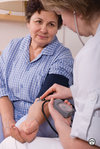

(NAPSI)—Did you know if you have high blood pressure you are at increased risk for chronic kidney disease?
High blood pressure, also called hypertension, is the second leading cause of chronic kidney disease in the United States. About 1 in 5 adults with high blood pressure may have chronic kidney disease, according to the Centers for Disease Control and Prevention.
Blood pressure is the force of blood pushing against the walls of your blood vessels. If your blood pressure gets too high, the blood vessels in your body—including those in your kidneys—may become damaged. This damage makes it harder for the kidneys to filter blood and remove wastes and extra water from the body. Kidney disease can get worse over time, and if not treated it can lead to kidney failure.
And while high blood pressure can lead to kidney disease, the reverse is also true: kidney disease can lead to high blood pressure. Simple tests can tell you whether you have high blood pressure or kidney disease. Ask your health care professional if you have been tested for high blood pressure and kidney disease.
Many people with kidney disease don’t know they have the disease until their kidneys begin to fail. Research suggests that fewer than 1 in 10 people who have kidney disease are aware they have the disease. This is because kidney disease often doesn’t have any symptoms early on.
The good news is that you can help protect your kidneys by managing high blood pressure with healthy lifestyle habits.
“Our research continues to uncover the complexities of the link between high blood pressure and kidney disease,” says Griffin P. Rodgers, MD, director of the National Institute of Diabetes and Digestive and Kidney Diseases (NIDDK), part of the National Institutes of Health (NIH). “And what we are finding supports the message that you can help protect your kidneys by managing high blood pressure with healthy lifestyle habits.”
Adopting healthy lifestyle habits that help you manage your blood pressure will also help to keep your kidneys healthy. You can prevent or slow kidney disease progression by taking the following steps to lower your blood pressure:
Take medicines as prescribed. Blood pressure medicines often play a key role in lowering blood pressure.
Aim for a healthy weight. If you are overweight or have obesity, reducing your weight may lower high blood pressure.
Select healthier food and beverage options. Follow a healthy eating plan that focuses on heart-healthy foods such as fruits, vegetables, whole grains, and lean meats that are low in sodium.
Stop smoking. Smoking damages blood vessels, increases your risk for high blood pressure, and worsens problems related to high blood pressure. For help quitting, call 1-800-QUITNOW or go to Smokefree.gov.
Get enough sleep. Lack of sleep can have an adverse effect on your blood pressure and metabolism. Aim for 7 to 8 hours of sleep each night.
Manage stress and make physical activity part of your routine. Healthy stress-reducing activities and regular physical activity can lower blood pressure. Try to get at least 30 minutes or more of physical activity each day.
“You can manage your blood pressure and its complications through healthy lifestyle habits, which include exercise, following a healthy eating plan and taking blood pressure medication as prescribed by your doctor,” says Gary H. Gibbons, MD, director of the National Heart, Lung, and Blood Institute (NHLBI). “It’s important to know your numbers because controlling or lowering your blood pressure can prevent or delay serious complications like kidney disease and heart disease.”
For more information, visit the NIDDK website at www.niddk.nih.gov.